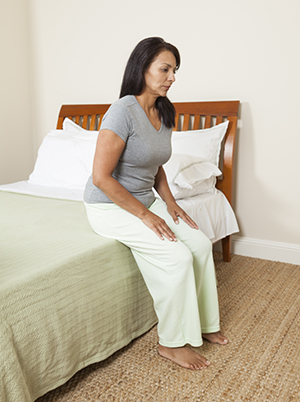Treating Syncope: Prevention
Treating Syncope: Prevention
If you have been told that your fainting is not caused by a heart problem, you can help prevent fainting. And you can learn to respond to your body’s warning signs.
For your safety and the safety of others, limit your driving as instructed. Do not operate heavy machinery. Also, be careful not to engage in activities that could cause injury if you lose consciousness. Ask your healthcare provider what activities are safe for you.
If you feel faint
Know the warning signs of fainting: weakness, nausea, dimmed vision, tunnel vision, sweating, feeling flush or warm, dizziness, lightheadedness, or a fast heartbeat.
Don’t ignore or fight any signs that you may faint.
Lie down until you feel better and elevate your feet if possible. Your symptoms should go away in about 20 to 30 minutes.
Small changes make a big difference
If you are in a conference, auditorium, or group setting such as a movie theater or play, sit near the aisle so you can leave if you feel faint.
Get up slowly after you have been lying down.
If prescribed, wear special stockings to keep blood from pooling in your legs.
If directed, add salt to your food to raise your blood pressure. Don’t skip meals.
Don’t stand for long. Shift your weight over your legs while standing. Shop when lines are short.
Drink water often, especially when exercising during hot weather.
Ask your healthcare provider if it is safe for you to drink alcohol, as this can cause syncope in some people.
The role of medicine
Medicines sometimes can play a role in both causing and preventing syncope.
Your medicines may be changed or reduced. Blood pressure medicine may cause fainting. Certain combinations of medicines may also make you faint. And some nonprescription medicines, herbs, and teas may cause symptoms, too. Tell your healthcare provider about any medicine you’re taking and if you started using a new one recently.
Medicines may be prescribed. Taking certain medicines can help prevent fainting. Your healthcare provider can discuss these with you.
Do not use illicit or recreational drugs. These can worsen your risk factors or interfere with prescribed medicines that your healthcare provider has given you.
Updated:
February 15, 2018
Sources:
Walsh, K., Syncope: Diagnosis and Management, Current Problems in Cardiology (2015); 40(2); 51-86
Reviewed By:
Image reviewed by StayWell art team.,Kang, Steven, MD,Snyder, Mandy, APRN
